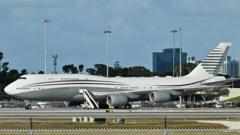The U.S. Department of Defense has accepted a Boeing 747 donated by Qatar for the Air Force One fleet. The move has sparked controversy due to potential violations of the Emoluments Clause and raised questions about foreign influence.**
US Defense Department Receives Controversial Aircraft Donation from Qatar**

US Defense Department Receives Controversial Aircraft Donation from Qatar**
A $400 million Boeing 747 intended for Air Force One raises legal and ethical concerns amid bipartisan criticism.**
The United States Defense Department has recently accepted a Boeing 747 from Qatar, a gift valued at approximately $400 million, to join the Air Force One fleet. While the Pentagon spokesperson has confirmed the legality of the acceptance, the decision has generated significant backlash, even among some of President Trump’s staunch supporters.
Chief Pentagon spokesman Sean Parnell stated, “The secretary of defense has accepted a Boeing 747 from Qatar in accordance with all federal rules and regulations.” Nevertheless, the aircraft, intended to serve as the presidential transport, will require extensive modifications to meet security standards, including enhancements to withstand an electromagnetic pulse from a nuclear event and refueling capabilities in mid-air.
Trump, defending the aircraft donation, claimed it to be a straightforward gift, emphasizing, “They're giving us a gift” and suggesting it would be “stupid” to decline. However, the acceptance of such a donation has raised concerns about adherence to the Emoluments Clause of the U.S. Constitution, which restricts federal officials from receiving gifts from foreign governments without Congress's sanction. Critics highlight that congressional approval for this transaction has not been secured.
The aircraft transfer is linked to the Qatari royal family and is slated to be moved to Trump's presidential library post-term. Experts, like Mark Cancian from the Center for Strategic and International Studies, predict that the retrofitting costs could soar to $1 billion, potentially burdening taxpayers.
Trump argued that the plane is being handed over to the defense department, not to him personally. He also maintained that he wouldn't utilize it after leaving the presidency. Meanwhile, the current Air Force One fleet comprises two older Boeing 747-200 jets, operational since 1990, alongside smaller 757s.
Trump's relationship with Boeing has been rocky, and delays in acquiring new models have further complicated matters. After secretly visiting the Qatari aircraft earlier this year, Trump emphasized that no “quid-pro-quo” was involved, framing the exchange as a government-to-government transaction. Qatari Prime Minister Sheikh Mohammed bin Abdulrahman bin Jassim Al-Thani reiterated this point, asserting that the deal is strictly between their respective defense ministries, with no personal ties implicating either party.
Despite these assurances, criticism persists, particularly concerning the potential appearance of impropriety. Republican Senator Rand Paul of Kentucky cautioned that the donation might cloud the U.S.'s judgment regarding Qatar's human rights record, while Senator Ted Cruz of Texas warned about the espionage risks linked to accepting such a lavish gift.
As the debate continues over the implications of this controversial donation, the U.S. faces critical questions about transparency and foreign influence in governmental affairs.




















